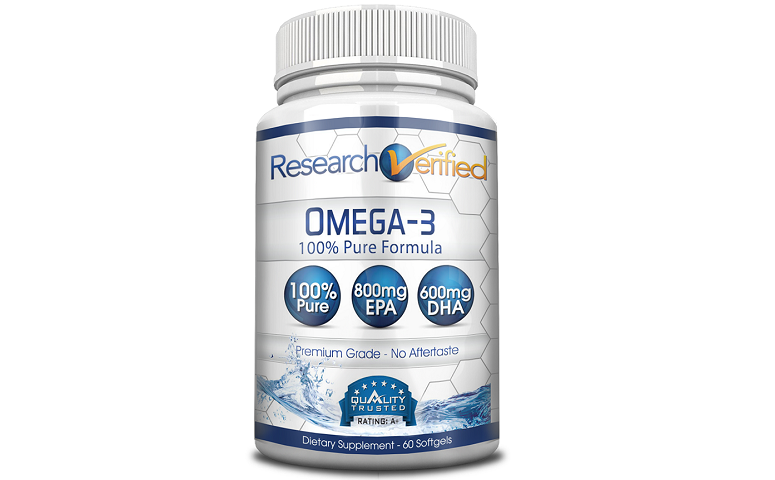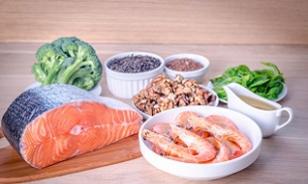Many individuals don't realize how important it is to receive enough Omega-3 nutrients. Omega-3 is a collection of fatty acids that are responsible for keeping the body healthy in numerous ways. Omega-3 helps keep the heart healthy by lowering triglyceride levels; it helps improve health conditions such as arthritis and asthma. It even helps improve mental conditions, such as depression, ADHD, and even Alzheimer's and dementia.
While Omega-3 is an important nutrient that everyone needs to consume, it is especially important for moms, or potential moms, to receive it on a daily basis. DHA, docosahexaenoic acid, and EPA, eicosapentaenoic acid, are the most important Omega-3 fatty acids an expectant or nursing mom needs to be receiving. This is because DHA and EPA are essential for a baby's early stages of development and growth.
During the third trimester of pregnancy, the fetus receives more DHA, which helps it develop normal eyesight and brain function. Some studies have revealed that women who get enough DHA during pregnancy, have children with better problem-solving skills. There is also a higher chance that their children will have better eye and hand coordination. They also decrease the chances of the child developing food allergies. Receiving the correct amount of Omega-3 fatty acids has also been linked to a decreased risk of premature delivery.
It's clear that pregnant and nursing mothers need to receive the correct amount of Omega-3, in order to assure that their child's development is healthy. Omega-3 is also necessary for the health of the mother as well, as it can decrease the risk of postpartum depression. However, actually consuming enough Omega-3 can be difficult, and many women fail to do so.
Some experts believe that recommend daily 200mg intake of DHA is too low, and recommend that pregnant women receive between 500-750mg of EPA and 800-1000 of DHA a day. This is especially true for women who plan to experience multiple pregnancies.
Don't let the thought of not consuming enough Omega-3 become too overwhelming, as we've researched a few ways pregnant and nursing moms can get their recommended daily Omega-3 nutrients.
Supplements
Taking Omega-3 supplements is probably the easiest and most common way to receive more Omega-3. They can be found in pretty much every pharmacy, and usually the dosage amount isn't large. However, not all Omega-3 supplements are up to par. Some supplements may not have enough Omega-3 in them, or they may cause unwanted side effects, such as fish taste or burping. Not all Omega-3 manufacturers are 100% truthful about what they are putting in their supplements.
So how can moms tell if an Omega-3 supplement is the right one? Well the best way is to consult a doctor and read customer reviews.
However, we've found one supplement company that always comes highly recommended, because they are trustworthy. Research Verified Omega-3 supplement is one of the best Omega-3 supplements on the market.
What makes Research Verified Omega-3 so great? For starters the daily dose of EPA is 800mg, and the daily dose of DHA is 600mg. While this is not as high of a dose as some experts recommend for pregnant women, it certainly puts them above the minimum dose of 200mg a day. Research Verified argues that anything less than the dose they provide their customers is an ineffective amount for anyone, not just pregnant and nursing mothers.
While having the correct amount of Omega-3 in their product is important, it isn't the only reason Research Verified Omega-3 stands out. Here are some other reasons this supplement is safe and trustworthy:
- Research Verified Omega-3 meets other doctor recommended criteria, such as containing no binders, fillers, or additives.
- Their ingredients are 100% pure.
- There are no harmful ingredients, such as polychlorinated biphenyls or mercury, that can sometimes be found in other supplements.
- Research Verified Omega-3 is backed by scientific research. It was formulated off of the data found in clinic studies, which can be found on Research Verified's website.
- Research Verified Omega-3 is manufactured in a cGMP certified lab. This means their staff, product, and laboratory have passed numerous safety inspections, making it one of the safest and cleanest labs in the country.
- They also comply with U.S Pharmacopeia standards.
- Research Verified has a 365-day return policy that allows unsatisfied customers to return used and unused products for a full refund.
- There are three different purchase options available online in order to make this supplement affordable for everyone who needs it.
Keep in mind that the label does warn pregnant and nursing mothers to consult a doctor before using Research Verified Omega-3. This is not to scare anyone, or to imply that it isn't safe. Since every pregnancy is different, it's always a good idea to consult a doctor before taking a new supplement.
Eat More Seafood
Another way to consume more Omega-3 is to eat more seafood. Seafood is known to be rich in Omega-3 acids. However, expecting mothers should stay away from swordfish, king mackerel, tilefish, shark meat, and large amounts of tuna, as they have been known to contain harmful toxins for pregnant women Instead try these types of fish: halibut, oysters, salmon, sardines, and trout. If eating fish doesn't sound appealing, then supplements such as Research Verified Omega-3 are probably a better option for receiving those nutrients.
Consume Other Omega-3 Rich Products
There are other foods and drinks that contain Omega-3. Certain types of oatmeal, or cereal, contain Omega-3. Nuts and seeds, such as walnuts or flaxseed, are good. Drinking milk and some types of juice can be another way to boost Omega-3 intake.
Other Omega-3 rich products include: eggs, margarine, yogurt, peanut butter, and packaged pizza.
Conclusion
Getting enough Omega-3 nutrients can be difficult, especially for pregnant and nursing mothers who need a higher daily dose of Omega-3. While some moms may decide to change their diet, and eat more foods containing Omega-3, not all women are able to do so. Therefore finding trustworthy Omega-3 supplements, such as Research Verified Omega-3, is a great alternative. Getting those Omega-3 nutrients will be extremely beneficial for both mom and baby.















